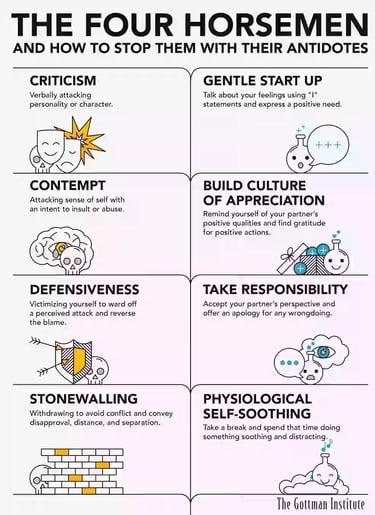Couples in Conflict
Learning to identify the Four Horsemen in your conflict discussions is the key to eliminating them and replacing them with productive communication patterns.
RELATIONSHIPS


The Four Horsemen is a concept described by Dr. John Gottman in his book "7 Principles for Making Marriage Work" which was based upon more than 40 years of research. Dr. Gottman identified 4 destructive behaviors that destroy relationships, so naturally, he also identified replacement behaviors, or antidotes, to repair the problems. In therapy we learn to identify the Four Horsemen and how to replace them with productive communication patterns.
1. Criticism
The first horseman is criticism. Criticizing your partner is a personal attack on their character. When you say, "You're so lazy!" or "I can't believe you don't care about this messy kitchen," you have called them a lazy uncaring person. Now they are offended and probably unlikely to really want to help you with your problem.
If instead you were to complain about the situation, it might sound like this, "When the kitchen is a mess like this, I get really frustrated and wish you would help out." You've just explained your feelings of frustration and a way your partner can help fix it.
2. Contempt
The second horseman is contempt. When we have an air of superiority or resentment, we can become really mean. Treating our partner with disrespect, mocking them with sarcasm and ridicule, calling them names, and mimicking them or using body language such as eye-rolling or scoffing, just leaves our partner feeling worthless. You might be "right" about everything and winning the argument, but you're not improving your relationship. I always say that being right means you can stand on top of the mountain and yell "I am right!" and everybody below can hear you, but you're ALONE on top of the mountain and none of us really want to come up there and share the space with you. Being right isn't everything. Problem solving on the other hand feels kind of good. . The target of contempt is made to feel despised and worthless.
Contempt goes far beyond criticism. While criticism attacks your partner’s character, contempt assumes a position of moral superiority over them:
“You think I'm to blame? Give me an example of one time I've done what you're doing. Just one! What? You can't think of one? Then I'm right and you need to say it. You're wrong, I'm right, and your tears mean nothing."
Contempt is the single greatest predictor of divorce. It must be eliminated.
3. Defensiveness
The third horseman is defensiveness. When we feel attacked by criticism, we naturally respond in a defensive manner. However, instead of being a victim, if we were honest with ourselves, there may be a bit of truth to what our partner is saying. "You're always late," might be that I am often late and my partner is frustrated. A typical defensive response would be, "Well, you're late a lot too and I wait for you all the time." However, if we took our partner's concerns seriously, we could respond with, "I hear your frustration and I am working on being better." If you truly mean it and your partner can see that you're trying, you're on your way to solving a problem, and that's the goal.
4. Stonewalling
The fourth horseman is stonewalling. You've probably heard it called "giving the silent treatment" but it can also be that you simply check out of the conversation and are not listening which can be apparent with your body language. It can be that you stopped responding and are just listening and not giving any acknowledgment to what your partner is saying. Tuning out, turning away, acting busy, or being distracted are also examples of stonewalling.
Some people say, "But I'm not in a good place and I need them to back off and give me a break," and that's probably true. When you feel flooded, emotionally overwhelmed, you really aren't able to listen and take in what your partner is saying. You aren't in the right headspace to listen for understanding and problem solve. In that case, you need to ask your partner for a Time Out and take a break to calm yourself back down. Go into the other room and take 20 minutes to take close your eyes and take deep breaths or fold some laundry. Don't spend 20 minutes planning how you're going to return and win the argument; this is a time for you to calm down so you can return and work out the problem.
Conclusion
I ask clients to watch themselves for a week or so and see which of the Four Horsemen they see in their relationship. Usually they find more than one if not all of them. Awareness is the beginning of change, so now that we see them, we catch ourselves when it's happening, and we stop and replace our behavior with a better one. It takes practice to develop new responses and interactions with our partners. And then there's more to work on... listening for understanding, negotiations, compromise, etc.
You can watch Dr. Gottman explain the Four Horsemen on YouTube if you want more of an explanation. And if you want to work with me, just give me a call.




